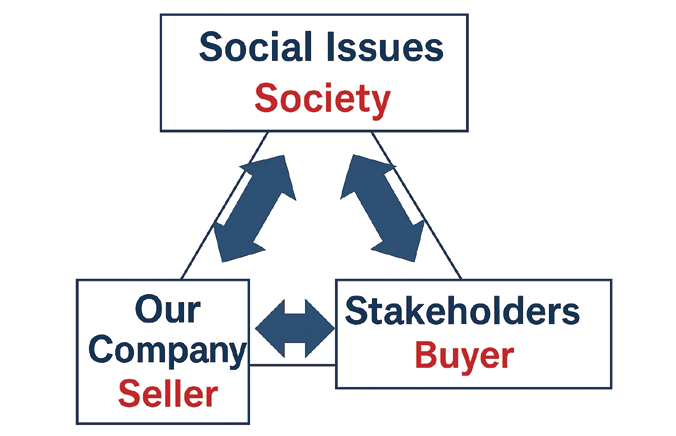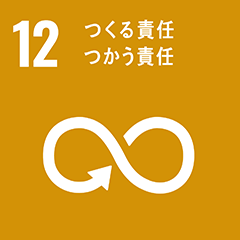Inochi Declaration
Realize a society where companies take responsibility for their actions, articulate their envisioned future, and engage in dialogue with society, working together to solve environmental and social issues.
Which of the following statements feels more accurate to you?
(A) Economic activity causes distortion.
(B) Economic activity can solve social issues.
The world population has grown from 2.5 billion in 1950 to 6.9 billion in 2010—nearly tripling—while GDP has increased approximately tenfold. On average, humanity has become three times wealthier in those sixty years. Overall social activity has rapidly expanded since 1950. On the other hand, according to the Earth Overshoot Day index, as of August 1st, 2024, humanity had already consumed more resources than the Earth can regenerate in a year.*1 In effect, we are living on borrowed resources in exchange for economic growth.
At the 1999 World Economic Forum in Davos, then-UN Secretary-General Kofi Annan urged global markets—where the pace of expansion had outstripped the development of social and political systems—to become more “human.” This led to the establishment of the UN Global Compact*2, which introduced universal principles for all businesses to uphold in the areas of human rights, labor, environment, and anti-corruption. In 2020, amid the COVID-19 pandemic, the Davos Manifesto was revised for the first time in 50 years*3, marking a major shift in direction. It moved away from the traditional shareholder-centric model—where the company exists primarily to benefit its owners—and toward a new understanding that companies must serve all stakeholders, including employees, customers, suppliers, local communities, and broader society. It declared that corporate value lies not only in profit distribution to shareholders, but also in the creation of social value and action toward a sustainable future.
For businesses to contribute to a sustainable society, they must earn the trust of society to be entrusted with the future. In this process, information disclosure and transparency have become increasingly important. While regulatory frameworks such as European directives and corporate governance now require ESG (Environmental, Social, and Governance) disclosure, what is needed more is voluntary and sincere communication and engagement rather than mere compliance through mandatory external audits.

Structure of “Sanpo-yoshi”
Among the measures set forth in Japan’s 2020 “National Action Plan on Business and Human Rights” is the promotion of “consumer-oriented management,” which encourages corporations to solve social issues in collaboration with consumers*4. This includes advancing ethical consumer behavior, such as avoiding products made through unsustainable practices or exploitative labor (e.g., slavery or child labor). This initiative supports SDG Target 12.8: “information and awareness for sustainable development and lifestyles in harmony with nature.” According to the Consumer Affairs Agency, the term “consumer” includes a wide range of stakeholders. “Consumer-oriented mangement*5” refers to a form of management that improves social value in co-creation with these stakeholders. This approach resonates with the Omi merchants’ philosophy of mutual prosperity: “Sanpo-yoshi” (good for the buyer, seller, and society). It offers a framework for companies to consider whom to partner with, which social issues to address, and what actions to take.
Based on the above, the Inochi Forum will further advance collaboration with business leaders engaged in sustainability, along with related organizations and civil society, to help achieve the SDGs by 2030 and beyond—striving to resolve environmental and social challenges and to build a society that protects peace and Inochi through the dynamic principle of mutual benefit.
[Notes]
*1 Earth Overshoot Day – Geneva Environment Network https://www.genevaenvironmentnetwork.org/resources/updates/earth-overshoot-day/
*2 Kofi Annan’s address to World Economic Forum in Davos | United Nations Secretary-General https://www.un.org/sg/en/content/sg/speeches/1999-02-01/kofi-annans-address-world-economic-forum-davos
*3 Davos Manifesto 2020: The Universal Purpose of a Company in the Fourth Industrial Revolution | World Economic Forum
https://www.weforum.org/stories/2019/12/davos-manifesto-2020-the-universal-purpose-of-a-company-in-the-fourth-industrial-revolution/
*4 Action Plan on Business and Human Rights (2020-2025)
https://www.mofa.go.jp/mofaj/files/100104121.pdf
*5 Consumer Affairs Agency ‘Learn about consumer-oriented management’
https://www.caa.go.jp/consumers/consumer_oriented_management/
[Action Platform]
Economy, Employment and Poverty
[SDGs]



